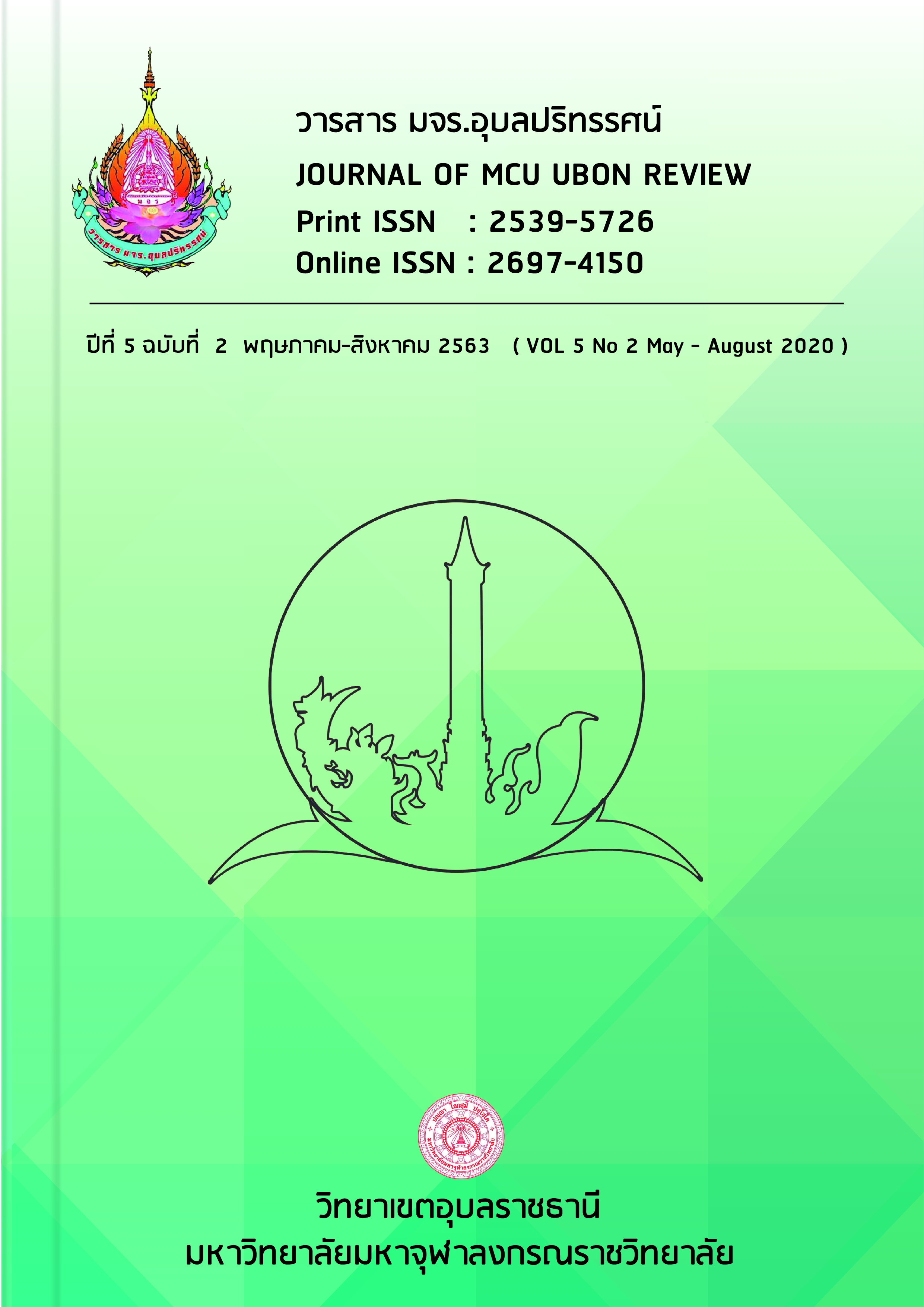THE EFFECTS OF WORD CARDS STRATEGY ON VOCABULARY KNOWLEDGE OF GRADE 5 ELEMENTARY STUDENTS AT BANSAWATHI SCHOOL
Main Article Content
บทคัดย่อ
งานวิจัยนี้มีจุดประสงค์เพื่อศึกษาผลกระทบของการใช้บัตรคำศัพท์ที่มีต่อความรู้คำศัพท์ของนักเรียนระดับชั้นประถมศึกษาปีที่ 5 โรงเรียนบ้านสาวะถี และการรับรู้ของนักเรียนที่มีต่อการใช้บัตรคำศัพท์ เครื่องมือที่ใช้ในงานวิจัย ประกอบด้วย แบบทดสอบคำศัพท์ก่อนเรียนและหลังเรียน และแบบสอบถามการรับรู้ของนักเรียนที่มีต่อการใช้บัตรคำศัพท์ คำศัพท์ที่นำมาใช้ในงานวิจัยนี้ได้คัดเลือกมาจากบัญชีคำศัพท์ของกรอบมาตรฐานการประเมินความความสามารถทางภาษาจากประเทศในกลุ่มสหภาพยุโรป (CEFR) ระดับ A1
ผลจากการแบบทดสอบคำศัพท์ก่อนเรียนและหลังเรียน พบว่า การใช้บัตรคำศัพท์ช่วยพัฒนาความรู้คำศัพท์ของนักเรียนทั้งในด้านของการจดจำคำศัพท์, การจดจำความหมายของศัพท์, และการใช้คำศัพท์ ผลจากแบบสอบถามการรับรู้ของนักเรียน โดยรวมพบว่า นักเรียนมีการรับรู้ในเชิงบวกต่อการใช้บัตรคำศัพท์ ในด้านความพึงพอใจต่อการใช้บัตรคำศัพท์พบว่านักเรียนพึงพอใจอย่างมากต่อการใช้บัตรคำศัพท์ ในด้านประโยชน์ของการใช้บัตรคำศัพท์พบว่านักเรียนรับรู้ว่าการใช้บัตรคำศัพท์มีประโยชน์ และในด้านการใช้บัตรคำศัพท์พบว่านักเรียนรับรู้อย่างมากต่อการใช้บัตรคำศัพท์
Article Details
เอกสารอ้างอิง
Black, K. (2010). Business Statistics: Contemporary Decision Making 6th edition.
John Wiley & Sons.
Catalan, J.M.R. (2003). Sex differences in L2 vocabulary learning strategies.
International Journal of Applied Linguistics, (13)1, 54-77.
Chen, C. M., & Chun, C., J. (2008). Personalized Mobile English vocabulary
Learning System Based on Item Response Theory and Learning Memory Cycle. Computers & Education, (51)2, 624-645.
Diaz, JLC. (2016). Word Cards: An Effective or An Obsolete Strategy to Learn the
Spelling, Meaning and Grammatical Function of New Vocabulary. Revista Pensamiento Actual, (16)26.
English Language Institute. (2016). English Vocabulary Core List for Primary
Education Levels. Retrieved from www.mukdahan.org/news_file/p75850761016.pdf
Hedge, T. (2000). Teaching and Learning in the Language Classroom.
United Kingdom: Oxford University Press.
Humphrey, Abigail. (2016). Word-Cards in Action: A Classroom-based Study.
Thesis in the Department of Applied Linguistics. 2016.
Ketkham, K. (2004). Students’ Attitudes towards the Computer-Based Reading
Program in the Development Reading Course: The Impact on Their Reading Performances. Thai Journal of Development Administration, 44(2), 74.
Komachali, MA & Khodareza, M. (2012). The Effect of Using Vocabulary Flash Card
on Iranian Pre-University Students’ Vocabulary Knowledge. International Educational Studies, (5)3. 2012.
Kuo, Y & Ho, H. (2012). Effects of Word Card Strategy versus Word List Strategy on
Taiwanese EFL Junior High School Students’ Vocabulary Retention. Electronic Journal of Foreign Language Teaching, (9)1.
Laufer, B. (1992). How much lexis is necessary for reading comprehension? In H.
Bejont & P. Arnaud (Eds.), Vocabulary and applied linguistics (pp. 126-132).
London: MacMillan
Laufer, B., & Shmueli, K. (1997). Memorizing new words: Does teaching have anything
to do with it?. RELC Journal, 28, 89–108.
Likert, R. (1932). A Technique for the Measurement of Attitudes.
Archives of Psychology, 140, 1–55.
Mukandan, J. Baki, R. and Ayub, A. (2012). Second Language Learners’ Attitudes
towards the Methods of Learning Vocabulary. English Language Teaching,
(5)4, 24-36.
Nah, K. C., White, P., & Sussex, R. (2008). The Potential of Using a Mobile Phone to
Access the Internet for Learning EFL Listening Skills within a Korean Context. European Association for Computer Assisted Language Learning, (20)3, 331-347.
Nation, I.S.P. (1990). Teaching and Learning Vocabulary. New York: Newbury House.
Nation, I.S.P. (2001). Learning Language in Another Language. Cambridge: The Pitt Building.
Nation, I.S.P. (2005) Teaching and learning vocabulary. In E. Hinkel (ed.) Handbook
of Research in Second Language Teaching and Learning Mahwah, N.J.: Lawrence Erlbaum: 581-595.
Nation, I. S. P. (2008). Teaching vocabulary: Strategies and techniques. Boston, MA: Heinle.
National Institute of Educational Testing Service. (2017). O-NET Summary Score of
Grade 6 in the Academic Year 2017. Retrieved from www.newonetresult.niets.or.th
National Institute of Educational Testing Service. (2018). O-NET Summary Score of
Grade 6 in the Academic Year 2018. Retrieved from www.newonetresult.niets.or.th
Oxford, R. L. (1990). Language learning strategies: What every teacher should know.
Boston: Newbury House.
Perez, L & Alvira, R. (2017). The Acquisition of Vocabulary through Three Memory
Strategies. Research Article, (19).
Ranalli, J. (2009). Prospects for Developing L2 Students` Effective Use of Vocabulary
Learning-Strategies via Web-based Training. CALICO Journal, 27(1), 161-186.
Richards Jack C. (2015). Key Issues in Language Teaching. Cambridge: The Pitt Building.
Schmitt, N. (2010). Researching Vocabulary: A Vocabulary Research Manual.
New York: Palgrave Macmillan.
Schouten-van Parreren, C. (1989). Vocabulary learning through reading: Which
conditions should be met when presenting words in texts? AILA Review, 6, 75-85.
Ur, P. (2012). Vocabulary activities. Cambridge: Cambridge University Press.
Watcharapichitchai, Thanita. (2012). The Comparison of Achievement and Retention
in Learning Vocabulary Words by Game and Flashcard Techniques of the Fifth Graders. Thesis M.Ed. (Curriculum and Instruction). Chanthaburi: Rambhai Barni Rajabhat University.
Ying He, K. (2010). A Study of L2 Vocabulary Learning Strategies. Thesis.
Kristianstad University.


